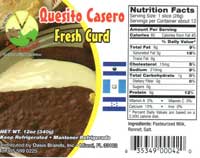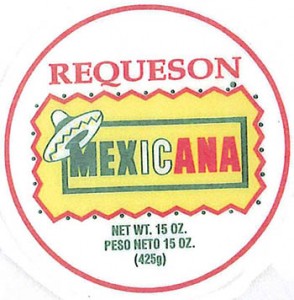Listeria in soft cheese has been the source of two deadly multistate food poisoning outbreaks so far this year. Last month, the Centers for Disease Control and Prevention (CDC) announced a three-state outbreak linked to Oasis cheeses that killed one person and sickened two others. And, in March, an outbreak linked to Roos Cheese sickened eight people in Maryland and California, killing one of them.
 Soft cheeses, such as queso fresco, are often associated with Listeria monocytogenes which can grow in at room temperature and in refrigerator temperatures. Pregnant women are at special risk for Listeria, which can cause miscarriage, stillbirth, premature birth and listeriosis in newborns.
Soft cheeses, such as queso fresco, are often associated with Listeria monocytogenes which can grow in at room temperature and in refrigerator temperatures. Pregnant women are at special risk for Listeria, which can cause miscarriage, stillbirth, premature birth and listeriosis in newborns.
In the Oasis outbreak, one illness was related to a pregnancy and was diagnosed in a newborn. The three cases were reported from New York, Tennessee, and Texas. The fatality was reported in Tennessee. All three patients required hospitalization. The two surviving patients reported consuming quesito casero before they became ill.
Health officials used whole-genome sequencing (WGS) and pulsed-field gel electrophoresis (PFGE) to link the strain of Listeria found in the cheese to the bacterial strain found in those who became ill. On August 4, Oasis issued a recall for quesito casero, then a recall October 6 for cuajada en hoja, then a recall October 16 for various cheeses sold under the Lacteos Santa Martha brand.
 Health officials found unsanitary conditions and food safety violations at Delaware-based Roos Foods Inc. Eight adults and children were sickened in that outbreak, one of them died. Adults interviewed said they ate Hispanic-style cheese before they became sick. Three remembered purchasing Roos cheese, all of them said they bought soft cheese from a Mega Mar store.
Health officials found unsanitary conditions and food safety violations at Delaware-based Roos Foods Inc. Eight adults and children were sickened in that outbreak, one of them died. Adults interviewed said they ate Hispanic-style cheese before they became sick. Three remembered purchasing Roos cheese, all of them said they bought soft cheese from a Mega Mar store.
Tests of Roos cheese products made repackaged and sold at Mega Mart stores have tested positive for Listeria monocytogenes bacteria. Roos issued a recall for soft cheeses and other dairy products.
“You hope for swift justice in situations like these to relieve just a fraction of the trauma that families are experiencing,” said Fred Pritzker, Food Poisoning Bulletin publisher and food safety attorney who has represented clients who been sickened by Listeria monocytogenes bacteria.




